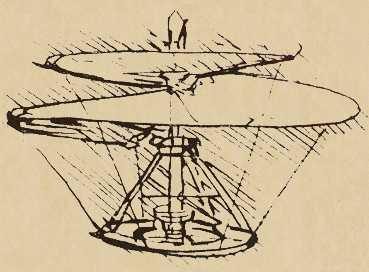Leonardo’s Human-powered Helicopter Realised

The above image is Leonardo da Vinci's 15th century sketch of a "helical air screw," drawn nearly 400 years before the first helicopter was built.
A team of Canadian engineers from the University of Toronto have achieved the first human-powered helicopter flight, hundreds of years after Italian inventor Leonardo da Vinci sketched designs for a human-powered flying machine.
The Canadians’ AeroVelo Atlas device became the first human-powered helicopter to complete a flight that lasted 64 seconds and reached an altitude of almost 11 feet. The team’s efforts won it the American Helicopter Society’s Igor I. Sikorsky Human-Powered Helicopter Competition and US$250,000 in prize money.
The winning machine is made of carbon fibre, weighs 120 pounds and has a span of almost 154 feet. It was piloted by a national-level speed skater and competitive athlete, Todd Reichert. He pedalled his flying machine to turn four large rotors.
In the late 15th century, Leonardo made notes and drawings of the Helical Air Screw, which mapped out exactly how a human-powered helicopter would operate.
The American Helicopter Society’s Igor I. Sikorsky Human-Powered Helicopter Competition is the third largest monetary prize in aviation history. The challenge requires a human to hover to an altitude of three metres (9.8 feet) under his/her own power, and to remain aloft for at least one minute in what is a test of ingenuity, athleticism and determination.
Topic:Culture Leonardo Da Vinci History
You may also be interested in...
Latest property in Italy
370 m²
7 Bedrooms
279000
210 m²
4 Bedrooms
135000
270 m²
4 Bedrooms
395000
0 m²
8 Bedrooms
1950000
0 m²
8 Bedrooms
0
What to do in Italy
Speak, live and enjoy Italian with Renata: homestay experience in the heart of Milan, in-person and online lessons
8-day Puglia small group guided tours, Southern Italy








